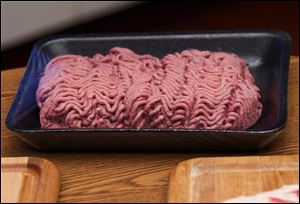
Area school menus to shun ‘pink slime’
6/9/2012
The beef product known as pink slime or lean finely textured beef on a tray at the Beef Products Inc. plant in South Sioux City, Neb.
Don't expect to find any "pink slime" in area school cafeterias next year.
Most of the nation's school districts are avoiding the beef product that caused a public uproar this year.
The U.S. Department of Agriculture says the vast majority of states -- including Ohio -- participating in its National School Lunch Program have opted to order ground beef without the product known as lean, finely textured beef.
Toledo Public Schools orders all its beef products through the USDA, and Reynald Debroas, the district's director of child nutrition, has not yet been told what products will be available for next year, TPS spokesman Patty Mazur said.
"But he is 100 percent guaranteeing that we will not be purchasing any beef product with pink slime," Ms. Mazur said.
In fact, according to Debra Warren, nutrition services supervisor for Washington Local Schools, food service directors were told by a USDA representative recently that Ohio schools would not receive meat with "pink slime."
States actually had to ask for beef with "pink slime" for next year, the USDA said. Only three -- Iowa, Nebraska, and South Dakota -- chose to order beef that may contain the filler.
The product has been used for decades, and federal regulators say it's safe to eat. It nevertheless became the center of national attention after the nickname "pink slime" was quoted in a New York Times article on the safety of meat processing methods. The filler is made of fatty bits of beef that are heated, then treated with a puff of ammonia to kill bacteria.
In response to the outcry, the USDA said in March that it would for the first time offer schools the choice to buy beef without the filler for the 2012-2013 school year. The agency still affirms that lean, finely textured beef is a safe, affordable, and nutritious product that reduces overall fat content.
Beef Products Inc., the South Dakota company that makes the product, said in an emailed statement that the development is not reflective of the quality or safety of the beef it produces.
"Based upon the misrepresentations that have been pervasive in the media to this point, it comes as no surprise that the majority of states have currently elected to purchase ground beef that does not contain lean, finely textured beef," Craig Letch, the company's director of food safety and quality, said in the statement.
The company announced this month that it will shutter three of its four plants as a result of the controversy. In the meantime, it has set up a Web site, beefisbeef.com, to combat what it says are myths about the product.
As of May 18, the USDA said states ordered more than 20 million pounds of ground beef products that don't contain lean, finely textured beef. Orders for beef that may contain the filler came to about 1 million pounds.
Because schools were not given a choice last year, all states may have received beef with the product.
The USDA estimates that the product accounted for about 6.5 percent of ground beef orders. Beef without the product is expected to cost 3 percent more than beef that contains it.
Ms. Mazur said she did not expect TPS to pay more this year for meat.
About 60 percent of the ground beef acquired by schools was through the USDA's National School Lunch Program, according to the agency's latest survey. The rest is bought by schools or school districts directly through private vendors.
The beef companies from which Perrysburg Schools buys products told school officials they don't use "pink slime," district spokesman Rachel Johnson said.
Sylvania Schools orders its beef products from a private commodities company, district spokesman Nancy Crandell said. The company provides meat products already cooked. "They are confident there is no 'pink slime' in it," she said.
Schools aren't the only ones rejecting the product. Many fast food chains and supermarkets have vowed to stop selling beef with the product.
Staff writer Nolan Rosenkrans contributed to this report.